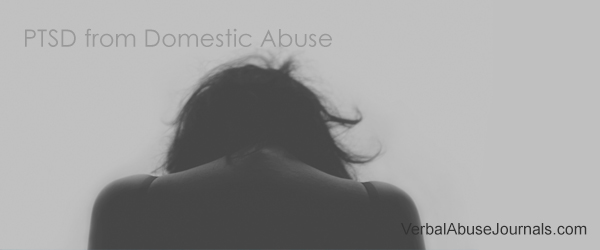PTSD Affects 10 Percent of Domestic Abuse Survivors
Posttraumatic stress disorder (PTSD) from domestic abuse affects a great number of abused and previously abused women. Women, in general, develop PTSD from domestic abuse more often than men in part because
… women are more likely to experience trauma within established relationships or their traumatic exposures are more chronic than those experienced by men (e.g. ongoing interpersonal violence within a marriage).1
Trauma that causes PTSD comes from any experience that leaves a lasting, negative effect that interrupts your life. PTSD from domestic abuse can mess with your peace of mind even after you’ve left an abusive relationship (Long Term Verbal Abuse Symptoms).
Typically, symptoms of PTSD show within three months of a traumatic event. With domestic abuse, however, we can easily overlook the symptoms of PTSD. PTSD symptoms hide behind excuses like
- “I’m over-emotional,” or
- “I’m just jumpy,” or
- “Stress is high at work”
- “I’m not sleeping well, that’s all” and many others.
Sometimes PTSD symptoms stay hidden for years. Then the symptoms can explode when something similar triggers you to remember the abuse at a later time.
PTSD from domestic abuse can form within an abusive relationship without the victim’s knowledge. It sneaks in under the radar because the cycle of abuse keeps victims tense and re-experiencing the trauma of the abuse daily. There’s no break in the cycle of abuse; therefore, a domestic abuse sufferer may notice no difference at all between the symptoms of PTSD and her day-to-day stress.3 Additionally, long-term domestic abuse sufferers can develop Complex PTSD (C-PTSD), described by OutOfTheFog.com as
…chronic or long-term exposure to emotional trauma over which a victim has little or no control and from which there is little or no hope of escape…
Symptoms of PTSD
The symptoms of PTSD 4 generally fall into three broad categories:
- avoidance and numbing
- increased anxiety or hyperarousal
- and intrusive memories
Avoidance and numbing include:
- difficulty remembering things
- trouble concentrating
- avoiding activities you once enjoyed
- avoiding conversations about the distressing event(s)
- problems maintaining close relationships
- and feeling emotionally numb
Increased anxiety or hyperarousal includes:
- feeling jumpy and easily scared
- engaging in self-destructive behaviors (like cutting, eating disorders, and substance abuse)
- seeing and/or hearing things that aren’t there
- overwhelming guilt/shame
- and trouble sleeping
Intrusive memories are memories that overwhelm you. You cannot stop replaying them in your mind. This could go on for hours or days, or disrupt your thoughts here and there. These memories can border on flashbacks, meaning they may cause you to feel the action is “right now” – not in the past. Intrusive memories also show up in nightmares and dreams. See the official criteria for PTSD diagnosis from the DSM-5.
Online Tests Check for PTSD from Domestic Abuse
Only a doctor can accurately diagnose you with PTSD from domestic abuse or any other trauma. However, there are online screenings that you can take. You can take the results to your doctor to open a conversation. When I took the test, I scored higher than I thought I would. It’s a shame if my abusive relationship with Will still affects me so deeply, but PTSD is one mental illness that will heal, with help (A Guided Meditation for Abuse Victims: Stop PTSD Auditory Flashbacks).
You can heal from PTSD, but you have to talk about your concerns first. Take an online PTSD test and see where you stand with the symptoms (try the PTSD Test at HealthyPlace.com). Most PTSD screenings do not differentiate between C-PTSD and PTSD. If the test you take refers to “the event,” consider that event as your entire abusive relationship. If you score high on the test, please talk to your doctor right away.
You can feel better! Abuse doesn’t have to affect you forever.
Sources
- 1 Research on Women, Trauma and PTSD, from VA.gov (Title fact also from this page)
- 2 The Frog in Boiling Water, at CarolineAbbott.com
- 3 Diseases and Conditions: Post-traumatic stress disorder (PTSD), from MayoClinic.org
Featured photo by Volkan Olmez
Similar Pages
- Emotional Abuse Changes Your Brain FAST
- Why Did It Take Me So Long to Leave My Abusive Marriage?
- Verbal Abuse Symptoms In Long-Term Relationships
- Depression Symptoms Show the Effects of Domestic Abuse
- PTSD from Domestic Abuse

